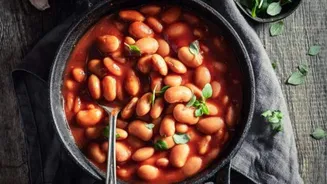Biological Factors
Several biological factors play a crucial role in our sugar cravings. Firstly, an imbalanced diet that lacks essential nutrients can trigger cravings. When
the body doesn't receive enough vitamins, minerals, and proteins, it may signal the need for quick energy sources, such as sugar. Secondly, blood sugar fluctuations are a significant contributor. Rapid spikes and drops in blood glucose levels can lead to cravings as the body tries to stabilize itself. Thirdly, the gut microbiome influences cravings. An unhealthy gut with an imbalance of bacteria can indirectly increase sugar desires, as certain bacteria thrive on sugar and signal the brain to crave it. Fourthly, hormonal imbalances can also lead to cravings, particularly in women during their menstrual cycles or menopause, when hormone levels fluctuate, affecting food preferences.
Psychological Influences
Psychological factors also exert considerable influence on sugar cravings. Stress and emotional eating are significant triggers. Stress can elevate cortisol levels, prompting the body to seek comfort foods high in sugar. Boredom can also contribute, as people may turn to sugary snacks as a distraction or to fill time. Habit and learned behaviors also influence cravings. Regular consumption of sugary foods creates habits, making these foods desirable over time. For example, the association of a specific activity, like watching television, with eating something sweet reinforces cravings. Moreover, reward and pleasure systems in the brain connect the taste of sugar with feelings of satisfaction. The release of dopamine when eating sugar reinforces this behavior and can make it more difficult to resist.
Insufficient Sleep Impacts
Lack of adequate sleep can significantly increase sugar cravings. When sleep-deprived, the body experiences hormonal imbalances that impact appetite control. Specifically, insufficient sleep increases the production of ghrelin, a hormone that stimulates hunger, while decreasing leptin, a hormone that signals satiety. This combination can lead to increased cravings and a desire for high-calorie, sugary foods. Additionally, sleep deprivation can negatively affect the brain regions responsible for decision-making and impulse control. This reduced cognitive function makes it harder to resist unhealthy food choices and can amplify the desire for immediate gratification, often fulfilled by sugar.
Dehydration & Cravings
Dehydration is often overlooked, but it can easily be a driver for sugar cravings. The body can sometimes misinterpret thirst as hunger, particularly in the case of cravings for sugary drinks or foods. This is because the body requires water for metabolic processes, and when it's not adequately hydrated, it might seek quick energy sources, such as sugar, to fulfill its needs. Moreover, mild dehydration can cause fatigue and reduced cognitive function, which may lead to increased cravings. Therefore, ensuring sufficient water intake is essential to prevent the sensation of false hunger and reduce cravings. This is especially important in a warm climate or during physical activity, when the body loses more water.
Sugar Addiction Explained
Sugar can be highly addictive, acting on the brain's reward pathways similarly to drugs. When sugar is consumed, the brain releases dopamine, leading to feelings of pleasure and reward. Regular intake can lead to tolerance, meaning more sugar is needed to achieve the same pleasurable effect. This creates a cycle of dependence. Furthermore, withdrawal symptoms, such as irritability, anxiety, and intense cravings, can occur when sugar intake is reduced or stopped. The brain's reward system can become overly sensitized to sugar, making it difficult to break the habit and increasing the risk of overeating and weight gain. Recognizing the addictive potential of sugar is crucial for managing cravings and making informed dietary choices.
Practical Control Strategies
There are numerous effective strategies to help manage and control sugar cravings. Firstly, a balanced diet rich in whole foods is essential. Focus on incorporating plenty of fruits, vegetables, lean proteins, and whole grains to provide essential nutrients and stabilize blood sugar levels. Staying hydrated is crucial, so drinking enough water throughout the day can prevent false hunger signals and reduce cravings. Secondly, prioritize sleep; aim for 7–9 hours of quality sleep each night to regulate hormones and support healthy appetite control. Managing stress through techniques like meditation, yoga, or spending time in nature can also lessen emotional eating. Another effective method is to slowly reduce added sugar by reading food labels and choosing less-processed foods. Consider healthier alternatives like fruit or dark chocolate, or find new ways to enjoy your favorite recipes with less sugar.
Additional Useful Tips
Beyond the core strategies, several additional tips can further support effective sugar craving management. Plan meals and snacks in advance to avoid impulsive, unhealthy choices when hunger strikes. Keep healthy snacks readily available, like nuts, seeds, or fruits, to satisfy cravings. Seek support from friends, family, or a professional to discuss and address emotional triggers and establish a positive eating environment. Make sure you slowly introduce these changes in your life. Be patient; breaking sugar cravings takes time. Also, keep a food journal to track your sugar intake and identify patterns that trigger cravings. Additionally, be mindful of portion sizes and practice conscious eating to connect with your body's signals of hunger and fullness. Regularly assess your progress and adjust your strategies as needed to maintain a sustainable, healthy relationship with food.



















